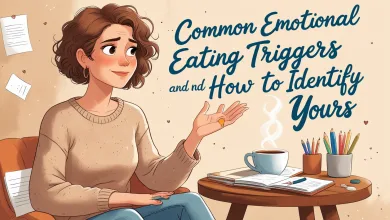Top Self-Help Books for Overcoming Emotional Eating

Struggling with emotional eating? You’re not alone. Millions turn to food for comfort, stress relief, or to fill emotional voids. These life-changing self-help books for overcoming emotional eating offer science-backed strategies, compassionate guidance, and practical tools to transform your relationship with food and emotions. Let’s dive into the very best resources that can help you break free from emotional eating cycles once and for all.
The Psychology Behind Emotional Eating: Why We Do It
Gosh, isn’t it frustrating when you find yourself elbow-deep in a bag of chips after a stressful day, even though you weren’t physically hungry? Emotional eating—using food to soothe feelings rather than to satisfy physical hunger—is incredibly common, yet often misunderstood.
The truth is, emotional eating isn’t actually about food at all. It’s about emotions. When we experience difficult feelings like stress, sadness, boredom, or even happiness, our brains can create powerful associations with food as a coping mechanism. Research from the University of Minnesota found that approximately 75% of overeating is caused by emotions rather than physical hunger. These patterns often develop in childhood and strengthen over time, becoming automatic responses that can feel impossible to control.
How Books Can Help Address Emotional Eating
Books offer a unique and powerful way to address emotional eating challenges. Unlike quick-fix diets or one-size-fits-all programs, quality self-help books provide comprehensive approaches that tackle the root causes of emotional eating. They’re also accessible, private, and can be worked through at your own pace.
The right book can offer several crucial elements for recovery: expert knowledge from specialists in psychology and nutrition, evidence-based strategies that have helped thousands of others, and perhaps most importantly, the understanding that you’re not alone in this struggle. Many authors of these books have personally overcome emotional eating, bringing both professional expertise and lived experience to their writing. As Dr. Susan Albers, psychologist and author of “Eating Mindfully,” notes, “Books provide a safe space to explore your relationship with food without judgment or shame—essential components for healing emotional eating patterns.”.
Life-Changing Books That Address Root Causes
“When Food Is Comfort” by Julie M. Simon
Julie Simon’s approach in “When Food Is Comfort” stands out for its deep dive into the emotional regulation deficits that often underlie emotional eating. Rather than focusing solely on food behaviors, Simon explores how childhood experiences shape our ability to self-soothe without food.
What makes this book particularly valuable is Simon’s “Inner Nurturing Process”—a step-by-step approach to developing the emotional skills many of us never learned as children. She combines neuroscience, mindfulness, and practical exercises to help readers identify emotional triggers and develop healthier coping mechanisms. The book includes journaling prompts and exercises that guide readers to reconnect with their bodies’ true hunger and fullness signals. According to a study published in the Journal of Behavioral Medicine, approaches that address emotional regulation skills show significantly better long-term outcomes than traditional diet approaches.
“Intuitive Eating” by Evelyn Tribole and Elyse Resch
Boy oh boy, is this book revolutionary! “Intuitive Eating” has become the cornerstone text for those looking to break free from diet culture while addressing emotional eating. Written by two registered dietitians, this book pioneered the non-diet approach that has now been validated by over 100 scientific studies.
Tribole and Resch guide readers through their ten principles of intuitive eating, which include rejecting the diet mentality, honoring hunger, making peace with food, and coping with emotions without using food. What’s particularly helpful about this book is its balanced approach combining both nutritional expertise and psychological wisdom. The authors recently released a 4th edition with updated research and expanded sections specifically addressing emotional eating triggers in our digital age. Many readers report that this book was the first resource that helped them understand the counterproductive nature of restriction in triggering emotional eating episodes.
Practical Strategy Books for Daily Implementation
“The Emotional Eating Workbook” by Carolyn Coker Ross
Let’s face it—understanding emotional eating is one thing, but developing practical skills to address it in the moment is another challenge entirely! “The Emotional Eating Workbook” bridges this gap beautifully with its action-oriented approach.
Dr. Ross draws on her background in medicine, psychiatry, and addiction medicine to provide a comprehensive set of tools based in Cognitive Behavioral Therapy (CBT) and mindfulness. The workbook format includes assessments to identify your unique emotional eating triggers, body awareness exercises, and specific strategies for different emotional states. Research published in the International Journal of Eating Disorders has shown that CBT-based approaches can reduce emotional eating episodes by up to 70% when practiced consistently.
The book’s standout feature is its “emergency toolkit” section—practical techniques you can use in those critical moments when emotional eating urges strike. Dr. Ross also addresses the often-overlooked connections between trauma, stress, and emotional eating, making this resource particularly valuable for those with complex emotional eating patterns.
“50 Ways to Soothe Yourself Without Food” by Susan Albers
This gem of a book tackles one of the biggest challenges in overcoming emotional eating: finding alternative ways to self-soothe. Dr. Susan Albers, a clinical psychologist specializing in eating issues, provides exactly what the title promises—50 specific, practical strategies to cope with difficult emotions without turning to food.
The genius of this book lies in its accessibility and variety. Albers organizes coping strategies into different categories: mindfulness techniques, distraction activities, cognitive reframing exercises, and sensory experiences. This means readers can find options that match their preferences and circumstances. Whether you have five minutes or an hour, whether you’re at work or at home, there’s a strategy that fits.
What makes this book particularly effective is how it helps rewire the brain’s automatic food-emotion connection. Neuroplasticity research shows that consistently practicing alternative behaviors can create new neural pathways. By regularly implementing these strategies, readers gradually develop new automatic responses to emotional triggers. The book also includes quick-reference guides for specific emotions, making it practical to use in the heat of the moment.
Mindfulness-Based Approaches to Emotional Eating
“Eating Mindfully” by Susan Albers
In “Eating Mindfully,” Dr. Albers applies mindfulness principles specifically to our relationship with food. Unlike general mindfulness books, this one provides targeted practices for the entire eating experience—from grocery shopping to post-meal thoughts.
The book breaks down mindful eating into practical skills anyone can learn, regardless of meditation experience. Readers learn to distinguish between different types of hunger (physical, emotional, sensory), recognize fullness cues, and develop awareness of eating triggers. Each chapter includes simple exercises that can be incorporated into daily life, making mindfulness accessible even for busy people.
What’s particularly valuable is Albers’ compassionate approach to setbacks. Rather than promoting perfect eating, she teaches how to use mindful awareness to learn from episodes of emotional eating without judgment. The second edition includes expanded sections on mindfulness for specific challenging emotions and eating situations. According to research from Duke University’s Center for Eating Disorders, mindfulness-based interventions show significant effectiveness for reducing emotional eating behaviors.
“The Mindful Eating Workbook” by Vincci Tsui
Taking mindfulness a step further, registered dietitian Vincci Tsui offers a comprehensive workbook that combines mindful eating principles with practical nutritional guidance. What distinguishes this book is its integrated approach that addresses both the psychological and physiological aspects of emotional eating.
Tsui’s workbook contains week-by-week exercises that gradually build mindful eating skills, from basic hunger awareness to navigating challenging social eating situations. The book also uniquely addresses diet culture’s impact on emotional eating, helping readers recognize how external food rules can actually trigger the very behaviors they’re trying to overcome.
The workbook format includes food and emotion journals with specific prompts, guided meditations for different eating scenarios, and progress tracking tools. Readers particularly appreciate the “compassionate curiosity” approach that Tsui promotes—learning to investigate eating behaviors with kindness rather than criticism. A study in the Journal of Academy of Nutrition and Dietetics found that combined approaches addressing both mindfulness and nutritional aspects showed better outcomes than either approach alone.
Body Image and Emotional Eating Connection
“Body Kindness” by Rebecca Scritchfield
Well, here’s the thing—emotional eating and body image issues often go hand in hand, creating a vicious cycle that’s tough to break. “Body Kindness” addresses this connection head-on, offering a refreshing approach focused on health enhancement rather than weight control.
Registered dietitian Rebecca Scritchfield introduces a framework based on self-compassion, mindful decision-making, and body respect. Rather than viewing emotional eating as a failure, she helps readers understand it as valuable information about unmet needs. The book includes “spiral up” practices—small, sustainable changes that create positive feedback loops in both physical and emotional wellbeing.
What makes this book particularly valuable for emotional eaters is its non-restrictive approach. Research consistently shows that body dissatisfaction and restrictive eating attitudes increase the risk of emotional eating episodes. By teaching readers to work with their bodies rather than against them, Scritchfield helps break this cycle. The book includes journaling exercises, compassionate self-talk scripts, and concrete practices for body appreciation that directly impact emotional eating behaviors.
“The Body Is Not an Apology” by Sonya Renee Taylor
Taking body image healing to an even deeper level, Sonya Renee Taylor’s groundbreaking book addresses the social and cultural roots of body shame that often fuel emotional eating. While not exclusively focused on eating behaviors, this book provides crucial context for understanding why so many people struggle with using food emotionally.
Taylor introduces the concept of “radical self-love” as a political act of resistance against systems that profit from body shame. The book combines personal narrative, cultural analysis, and practical exercises to help readers recognize and challenge internalized body negativity. For many emotional eaters, this broader perspective offers a missing piece in recovery—understanding that personal struggles with food and body often reflect larger cultural forces.
The second edition includes expanded tools for “unapologetic inquiry” into one’s relationship with food and body, helping readers identify how shame-based thinking influences eating behaviors. According to research from the Body Image and Eating Disorders Research Center, addressing systemic aspects of body shame significantly improves the effectiveness of emotional eating interventions.
Trauma-Informed Approaches to Emotional Eating
“The Emotional Eating Recovery Plan for Permanent Weight Loss” by Tricia Nelson
Don’t let the title fool you—while this book does address weight concerns, its primary focus is healing the emotional wounds that drive compulsive eating behaviors. Tricia Nelson, who overcame her own 30-year struggle with emotional eating, combines personal experience with professional expertise in addiction recovery principles.
What makes this book stand out is its trauma-informed approach that acknowledges the role of adverse childhood experiences in developing emotional eating patterns. Nelson introduces the concept of “emotional hunger” and helps readers identify their unique emotional eating type based on underlying emotional needs. The book provides specialized strategies for different types, whether you eat from stress, loneliness, or to numb painful feelings.
The recovery plan includes a 21-day jumpstart program with daily practices, journal prompts, and affirmations specific to emotional eating recovery. Nelson also addresses the often-overlooked spiritual dimension of healing, helping readers develop a sense of purpose beyond food and weight concerns. Research from the ACE (Adverse Childhood Experiences) Study shows that unresolved trauma significantly increases the risk of using food as a coping mechanism.
“The Food and Feelings Workbook” by Karen R. Koenig
With over 30 years of experience as an eating psychology therapist, Karen Koenig offers a deep dive into the complex emotional landscape underlying problematic eating in “The Food and Feelings Workbook.” This book stands out for its comprehensive approach to emotional literacy—a skill many emotional eaters lack.
Koenig guides readers through identifying and processing seven core emotions: anger, fear, sadness, shame, guilt, surprise, and joy. For each emotion, she provides specific exercises to increase awareness, expression, and regulation without using food. The workbook format includes assessments, journaling prompts, and concrete practices for building emotional tolerance.
What makes this resource particularly valuable is its developmental perspective. Koenig helps readers understand how childhood experiences shape adult emotional patterns and eating behaviors. The book includes specific recovery exercises for different attachment styles and family-of-origin issues. According to research in the Journal of Counseling Psychology, improving emotional regulation skills reduces emotional eating episodes by up to 60%.
FAQs About Self-Help Books for Emotional Eating
What’s the difference between emotional eating and binge eating disorder?
Emotional eating involves turning to food in response to feelings rather than physical hunger, while binge eating disorder (BED) is a clinical diagnosis involving recurrent episodes of eating large amounts of food with a sense of loss of control, marked distress, and specific diagnostic criteria including frequency requirements. Many emotional eaters don’t meet the clinical threshold for BED, but the behaviors exist on a spectrum. If you’re concerned about binge eating disorder, books can be helpful, but it’s important to consult with a healthcare professional for proper diagnosis and treatment recommendations.
Do I need to read these books in any particular order?
There’s no one-size-fits-all reading order, as different people have different needs in their emotional eating recovery. However, many readers find it helpful to start with a book that provides a comprehensive framework (like “Intuitive Eating” or “When Food Is Comfort”) to understand the big picture before diving into more specialized approaches. Books with practical tools like “50 Ways to Soothe Yourself Without Food” can be useful companions to more theoretical texts, providing immediate strategies while you work on deeper issues.
Can books really help with emotional eating, or do I need therapy?
Books can be incredibly helpful tools for understanding and addressing emotional eating, and for many people, they provide sufficient guidance for significant improvement. That said, emotional eating often has deep roots, and some individuals benefit from the additional support of therapy, particularly if trauma, depression, anxiety, or other mental health concerns are present. Many people find the most success with a combined approach—using books for education and daily practice while working with a professional for personalized guidance. If you’re unsure, consider starting with books and reassessing your needs after a few months.
How long does it take to overcome emotional eating?
Healing your relationship with food is a process rather than a destination, and timelines vary significantly from person to person. Most experts emphasize that sustainable change takes time—typically at least 6-12 months to establish new neural pathways and emotional habits. Rather than focusing on complete elimination of emotional eating (which sets an unrealistic standard), most of these books encourage measuring progress through increased awareness, expanded coping skills, and a more peaceful relationship with food. Geneen Roth, author of several books on emotional eating, notes that “healing happens in spirals rather than straight lines,” with progress often including both forward movement and temporary returns to old patterns.
Final Thoughts: Your Journey Beyond Emotional Eating
Whew! We’ve covered a lot of ground exploring these transformative self-help books for overcoming emotional eating. The journey to a healthier relationship with food isn’t always straightforward, but these resources offer evidence-based approaches, compassionate guidance, and practical tools to support you every step of the way.
Remember that overcoming emotional eating isn’t about achieving perfect eating—it’s about developing a more peaceful, intentional relationship with both food and emotions. Each of these books offers a slightly different approach because there isn’t a single path that works for everyone. You might find that certain books resonate more strongly with your specific needs and experiences.
As you explore these resources, be gentle with yourself. Emotional eating often develops as a coping mechanism—it’s been your way of taking care of yourself with the tools you had available. These books can help you expand your emotional toolbox, developing new skills for processing feelings without food. The goal isn’t to never eat emotionally again (even intuitive eaters occasionally eat for comfort!), but rather to have choice and awareness around your eating decisions.
I’d love to hear which of these books you find most helpful in your journey! Have you read any of them already? Do you have other recommendations that should be on this list? The path to healing your relationship with food is deeply personal, and sharing our experiences can help others find their way too.






